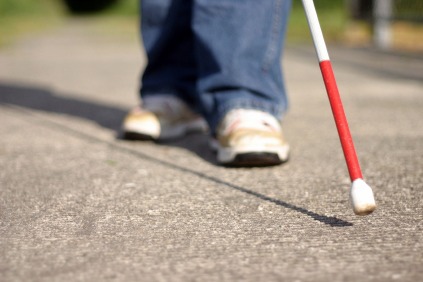
Are the Blind a Resource or a Liability? [Illustration by Shinod AP]
Over 50 years of freedom, the Indian society still views the visually disabled with pity and charity. Very few recognise or appreciate their potential or talents. In fact, the blind people themselves have little faith in their own ability and potential.
The education and rehabilitation system has done little to alter the traditional image. The blind child grows up in an environment that breeds diffidence, lack of ambition, initiative and motivation. The blind child’s dreams of a future are snuffed out even before he or she embarks on the journey of life.
The education systems must be reviewed and redesigned. It must evolve from merely providing basic learning skills and traditional vocational skills to providing opportunities for:
- Personality development
- Confidence building
- Communication skills development
- Attitude building
- Social skills building
- Passion for lifeIt is said that “knowledge is power,” but what is the use of power without confidence, without ambition or the right attitude.
Questions to be Addressed
- Is the blind population of the country viewed by planners, family, society as potential “human resource” or is it viewed as a potential drain on the financial resources?
- Do the planners draw up their education programmes and rehabilitation schemes truly believing that the blind would evolve to be contributors to national life?
- Do the parents send their children, who are blind, to school with dreams and ambitions for them?
- Are we dealing with a population that is of consequence?
- Are we really aware of the ability and potential of the blind?
- Does our system help produce blind youngsters who have the competence, confidence and the ambition to take on the world?
In the past one year, I have been conducting two-day communications workshops for blind students in different parts of the country. I have also been conducting cricket tournaments for the blind in different parts of India. I see great potential in each of the blind persons I have interacted with.Education must ideally provide the blind child not only learning and vocational skills, but also endeavour to nurture an intellect and a psychology that reflects and demonstrates confidence, a positive attitude and a passion for life. A combination of skills and a confidence that one can do it, could be the tonic to inspire the blind youth.The mind is more often than not the biggest hindrance to any kind of progress. The ‘cannot do’ syndrome is what holds people back from conquering the ‘Mount Everest of one’s mind’. Speaking from personal experience, it is often the mind that tells you what you can do or cannot do. For example, not everybody standing at the base of the mountain would venture to climb it. Only those who believe that they can do it will even try.
During my interactions with blind youngsters over the past ten years at cricket tournaments and training workshops, I have stumbled across several revealing facts. Facts that present a state of mind and a state of being. These interactions have thrown up several gaps in the prevailing programmes and education/ rehabilitation philosophy.
The blind are often isolated from the society right from early childhood, since they are admitted to blind schools and spend their formative years within the confines of the four walls of the blind schools and training centres. They get very limited experience of the real world. Hence, when they enter the real world, more often than not, they are ill-equipped to cope with day-to-day situations. They are full of diffidence and have a very poor sense of self worth.
Often in blind schools it has been seen that it is the sighted management that determines in its own wisdom as to what the blind can do and cannot do. If the management feels that candles are what the blind can make, then it is candle-making that the blind are taught.
This is a common management attitude or thinking that prevails right across the nation. There is no effort made to understand the aptitude or desire or potential of each individual blind person. In the case of normal children, the parents play an important role in determining the vocation of the child.
Living and moving about constantly in the company of blind people, the blind person is forced to think of the limitations imposed on him by his impairment rather than explore the possibilities with his ability. As a consequence the-frog-in-the-well syndrome sets in. The blind themselves start limiting their own potential.
I met a young girl in Mumbai during a workshop. She told me that she was destined to become a telephone operator. On interacting with her, I found that she had a wonderful command over both English and Hindi and possessed a very pleasing personality. She could very easily get into tele-marketing, radio broadcasting, voicing for advertisements or, for that matter, do a public relations job. A clear example of potential that has gone unrecognised.
During my interactions, I also discovered that most of the blind youngsters had very poor “general knowledge”. They were not only ill-informed, but also lacked the inclination to know. As an exercise, I ask the participants of the workshop to prepare a two-minute talk on any topic of their interest. Most of them spoke about problems faced by the blind or rights of the blind or some very elementary school boyish topic such as “Honesty is the best policy”.
Similar exercises done with normal students would throw up more contemporary topics that are based on the latest burning issues. I am forced to conclude that the blind have very limited access to information. This is a very serious concern specially when we are today living in a world where “information is power”.
Poor level of knowledge was also combined with low levels of skills in logic, analysis and communication. The ability to understand and analyse or deduce through logic was seen to be minimal. I also noticed that there was a fear or a reluctance to communicate or participate in a discussion.
I have also had the occasion to interact with people, while planning and running education and rehabilitation programmes. It was shocking to note that many of them saw the programmes with the blind as more of a noble duty that they were performing rather than nurturing a potential human resource for the country. This certainly reflects an attitude that we the visually impaired persons should be concerned about.
We are not looking for noble acts or charity, we need professionalism and accountability. To use corporate jargon, we are looking for results-oriented attitudes and programmes. We are dealing with human lives, time is of great importance. Time lost is opportunity lost.
Another critical area that needs to be addressed is the family of the blind child. Life begins with the family. The parents, more often than not, have a very negative mindset when it comes to the future of their blind child. They see no potential. I was told at some of these workshops that the parents just dump their children at blind schools and then simply forget about them.
Psychologists will tell you that the first four to five years of a child’s life is the most important years of a child’s development. If the child misses out due to the mindset of the parents or due to an ignorance of the potential of the blind child, it is as good as murder.
In most of the workshops, I observed that there was a great need for social and personal grooming. There was need for intervention in areas of posture, facial expression, dress sense, conversational skills, personal hygiene and interaction with the opposite sex among other things.
Another interesting observation I made was that the average blind student or youngster expects the world to help to the extent that he or she believes that help must come to them as a matter of right. This is a gross misconception and this attitude leads to bitterness towards the sighted world. The blind youth seems to think more of what the world should do for him rather than what he should do for himself.
There are a number of areas that need to be addressed. The blind youngster is today growing up in a very negative environment. The scenario cannot be changed overnight. But, periodic review of the system and bringing in changes with new ideas, programmes and use of modern technologies could alter the situation gradually.
Some Suggestions
1. Counselling
Parents need to be aware of the need to recognise the ability and the potential of their child. They need to be aware of what they should do to enable their child to get on with life. They need to be able to see into the future.
Towards this end, it is important to also train the ophthalmologist and all the medical personnel that the parents of the blind child might come across. This will enable the medical team to give positive advice.
Successful blind people should be drawn into the process of motivating and counselling the family.
2. Push hard for “inclusive education”
This will throw the blind child into the big world right from the start. This will not only expose the blind child to the world but also give the world the opportunity to be exposed to the blind child. Special schools could provide support services like braille, coaching, home work and other day-to-day requirements. This would give them greater access to education since there is a wider network of common schools across the country as compared to special institutions.
3. Training programmes
Regular training programmes in human resource development must be conducted with the objective of creating more aware, competitive and confident, young people of the blind. The programmes must address areas like communication skills, social skills, language development, team work and personal grooming.
4. Inspiration and motivation
Use successful blind people to set off dreams and ambitions. This will help the young people to start believing that they too can achieve. It will also give them new ideas.
5. Greater access to information
The information access points for the blind has to be increased. Public libraries like the British Council and city libraries should be encouraged to install reading equipment. Yes, these technologies are expensive for the average person. It can, however, be easily acquired by the organisations running the libraries. This could also apply to the various universities across the nation. This will certainly open up the flood gates for the blind to access information.
6. How to be successful
The blind must take pride in being successful. They should realise that there is no substitute to hard work. They have to develop a love for life. They must see life as an enjoyable experience.
Activities like sports and extracurricular programmes must be encouraged at a competitive level. These activities not only develop skills, but also serve as a training to achieve something with hardwork, discipline, will power and dedication. These activities encourage passion, ambition and self worth.
The biggest stumbling block to the rehabilitation programme is the overwhelming perception that the blind cannot do anything, and over emphasis on the disability. In most conferences, speakers repeatedly call for awareness building.
The question is how do we build awareness?
Editorial coverage and promotional advertising are some of the ways to do it. However, the most effective way of doing it is to enable our education and rehabilitation system to consistently produce successful people year after year.
Hence, our education system, in addition to providing knowledge, must:
- Teach the blind to dream about their future.
- Bring out a passion and a zest for life in the blind.
- Provide them with guidance, direction and encouragement.
- Help them believe in themselves and translate their knowledge and skills into opportunity.
- Provide them with guidance, direction and encouragement.
- Help them become performers and winners rather than be survivors and parasites.










